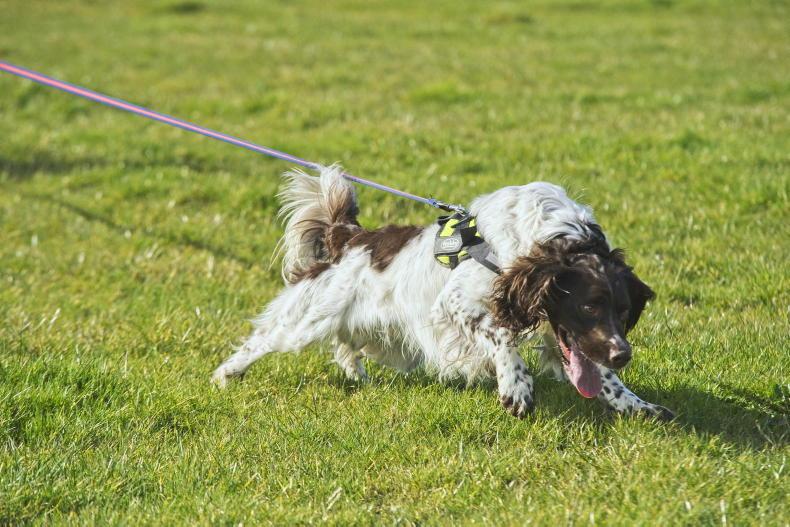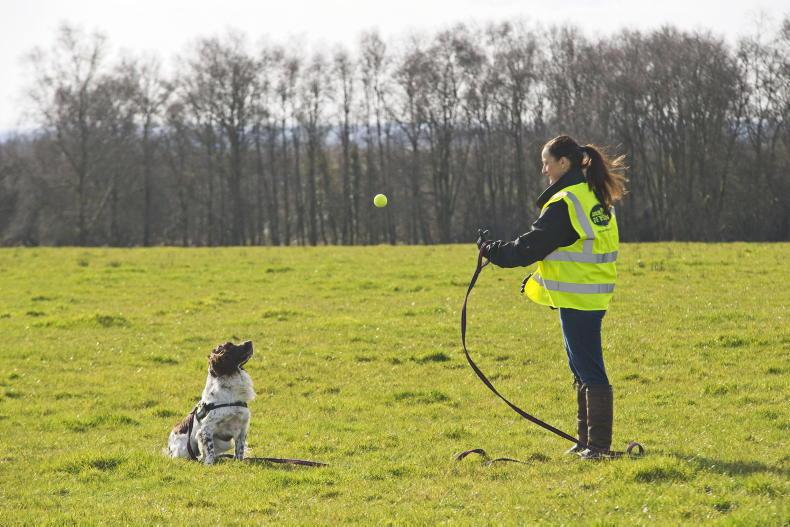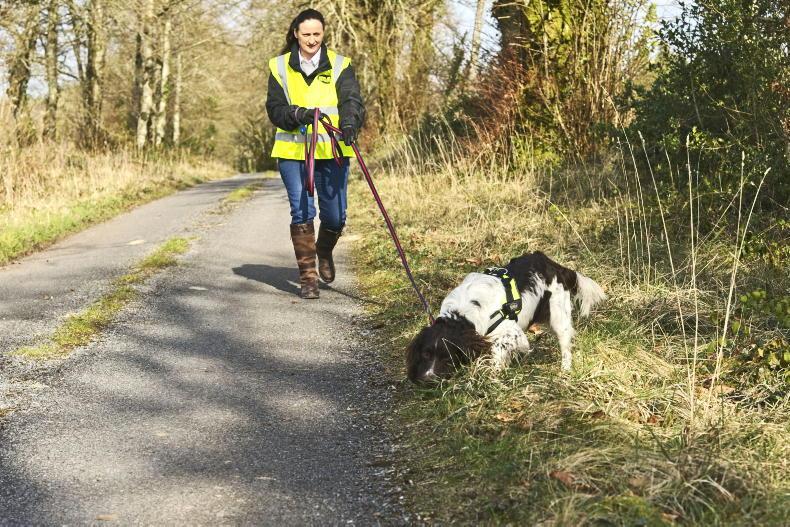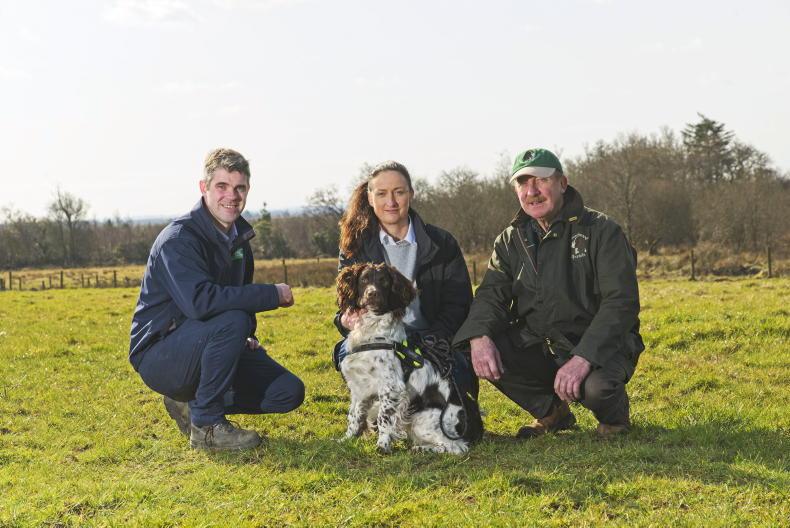Ireland is losing 42% of its treated water supply annually, with Irish Water spending around €100m each year since 2017 to repair 1,500 leaks per month.
For a country with no shortage of water, Ireland is remarkably good at losing it.
Now Roscommon man Enda Mahon has developed a unique new detection tool for leaks – his name is Rex and he loves his ball.
Canine leak detection has been used across the world for many years, but Enda and the team at Anubis Detection are the first to offer the service in Ireland.
The Ballymoe man spent almost two decades working in the water, oil and gas pipe industry, in Ireland, England and Australia.
“I saw canine leak detection at first hand working successfully in other countries and it was always in the back of my head when I saw the huge water losses and difficulty detecting leaks,” he told the Irish Farmers Journal.
“I thought there had to be an opening for this niche in the sector here in Ireland.”
Why dogs?
Enda explained why canine leak detection works where the traditional methods may fail.
“Traditional leak detection methods rely on sound and sight, and in certain scenarios such as in areas near streams or busy roads, traditional methods are ineffective.

Rex is a hand-picked 18-month-old springer spaniel. He has received over six months' training in leak detection.
\ David Ruffles
“A dog’s sense of smell is very strong, meaning they can detect scents that humans can’t. They can sniff out the chlorine in the water, and therefore can distinguish between natural groundwater and leaks on drinking water pipelines.”
Last year, Enda went about sourcing a dog for the job. He initially thought that any dog could be trained to detect leaks, but soon learned this wasn’t the case. After several failed attempts, a friend directed him to Carmel Egan and Eamonn Moran at Laurel Wood Kennels, near Kilkerrin in east Galway, where he found Rex, an 18-month-old springer spaniel.
The Laurel Wood team has over 30 years of dog training and handling experience.
Carmel, who trained and works Rex, says that only certain dogs can work as a water leak detection dog.

Once Rex identifies the leak, he sits on the spot and waits for his reward which is a ball and a click. \ David Ruffles
“They need to have a certain temperament, strong ball drive and be willing to please their owner, not themselves, which usually tends to be the case. We work with the dogs four to eight times daily to ensure they don’t lose interest in their work.
“We trained Rex to identify the scent of chlorine. Training a dog to pick up scent is the easy part. It’s getting them to work in an outdoor environment with all sorts of wildlife and distractions that is the hard part,” she says.
Springer spaniels, often employed as drug sniffing dogs, are suited more than most, she says, because they love to work and are very motivated to do what they have been trained to do.
“It can take six to 12 months to get a dog to the stage that it can accurately detect leaks. Dogs also need to get to know their handlers, and unless you’ve worked with a dog from the start of its training right through to it being put to work, the odds of it being a successful leak detection dog are very low,” says Carmel.

“It can take six 12 months to get a dog to the stage that it can accurately detect leaks” says Carmel.
Photograph by David Ruffles
“It’s a relationship, trust and dependency on one another that makes a leak detection dog and handler. Leak detection is almost like a game for dogs. There’s a fun atmosphere and the dogs sense that. They are happy to be out in the open. They get rewarded with a ball and a click for finding the leaks.”
The first trial
Aiming to set up his new business, Enda set up an independent trial for Rex with Noel Carroll from the Mid-Roscommon Group Water Scheme.
Noel sets the scene of the trial for the Irish Farmers Journal: “I brought Enda to a leak we had identified within an 800m section. It was a burst mains pipe which was losing 11,000 gallons per day. The stretch of piping was located in between a river and a crash barrier alongside a main road.
“The traffic on the road, the flow of the river and the wind blowing through the crash barriers was making it impossible to find the leak. We had been looking for the leak for three weeks using the most modern and up-to-date equipment available, but we couldn’t find it.

Canine leak detection has been used across the world for many years to find water leaks, but Enda and his team at Anubis Detection are the first to offer the service in Ireland. \ David Ruffles
“We even tried using other methods such as adding dye to the water. In the end we actually decided to bypass it. I said to Enda before he came down that if Rex finds this leak, he’ll make it. Within 30 minutes of arriving on site, the dog found the leak.”
“We went to a second site where we had been looking for a leak for over a week. Again, the dog found this leak within 10 minutes. I was very impressed, I can see a bright future for this service. We can find the easy leaks, but it’s the difficult ones with a stream, river or traffic nearby where the dog stands out,” says Noel.
Helping farmers to find leaks on land
Enda is now hoping to deploy Rex and his impressive nose to detect leaks nationwide.
As well as finding leaks for public and group water schemes, Enda envisages helping farmers and other landowners.
Although dogs are trained to sniff out chlorine in the mains water, Enda said he can add tap water to the landowners’ own supply so that the dog can detect leaks.
Although no prices for the service are set yet, it will be based on a travel rate plus an hourly fee.
“Our service won’t replace the modern technology, but it will complement it and work successfully alongside it,” he says. “We can also cover more ground and at a quicker pace. We’re really excited about what the future holds.”
To find out more about Rex and how he can detect leaks, go to www.anubis.ie.
Ireland is losing 42% of its treated water supply annually, with Irish Water spending around €100m each year since 2017 to repair 1,500 leaks per month.
For a country with no shortage of water, Ireland is remarkably good at losing it.
Now Roscommon man Enda Mahon has developed a unique new detection tool for leaks – his name is Rex and he loves his ball.
Canine leak detection has been used across the world for many years, but Enda and the team at Anubis Detection are the first to offer the service in Ireland.
The Ballymoe man spent almost two decades working in the water, oil and gas pipe industry, in Ireland, England and Australia.
“I saw canine leak detection at first hand working successfully in other countries and it was always in the back of my head when I saw the huge water losses and difficulty detecting leaks,” he told the Irish Farmers Journal.
“I thought there had to be an opening for this niche in the sector here in Ireland.”
Why dogs?
Enda explained why canine leak detection works where the traditional methods may fail.
“Traditional leak detection methods rely on sound and sight, and in certain scenarios such as in areas near streams or busy roads, traditional methods are ineffective.

Rex is a hand-picked 18-month-old springer spaniel. He has received over six months' training in leak detection.
\ David Ruffles
“A dog’s sense of smell is very strong, meaning they can detect scents that humans can’t. They can sniff out the chlorine in the water, and therefore can distinguish between natural groundwater and leaks on drinking water pipelines.”
Last year, Enda went about sourcing a dog for the job. He initially thought that any dog could be trained to detect leaks, but soon learned this wasn’t the case. After several failed attempts, a friend directed him to Carmel Egan and Eamonn Moran at Laurel Wood Kennels, near Kilkerrin in east Galway, where he found Rex, an 18-month-old springer spaniel.
The Laurel Wood team has over 30 years of dog training and handling experience.
Carmel, who trained and works Rex, says that only certain dogs can work as a water leak detection dog.

Once Rex identifies the leak, he sits on the spot and waits for his reward which is a ball and a click. \ David Ruffles
“They need to have a certain temperament, strong ball drive and be willing to please their owner, not themselves, which usually tends to be the case. We work with the dogs four to eight times daily to ensure they don’t lose interest in their work.
“We trained Rex to identify the scent of chlorine. Training a dog to pick up scent is the easy part. It’s getting them to work in an outdoor environment with all sorts of wildlife and distractions that is the hard part,” she says.
Springer spaniels, often employed as drug sniffing dogs, are suited more than most, she says, because they love to work and are very motivated to do what they have been trained to do.
“It can take six to 12 months to get a dog to the stage that it can accurately detect leaks. Dogs also need to get to know their handlers, and unless you’ve worked with a dog from the start of its training right through to it being put to work, the odds of it being a successful leak detection dog are very low,” says Carmel.

“It can take six 12 months to get a dog to the stage that it can accurately detect leaks” says Carmel.
Photograph by David Ruffles
“It’s a relationship, trust and dependency on one another that makes a leak detection dog and handler. Leak detection is almost like a game for dogs. There’s a fun atmosphere and the dogs sense that. They are happy to be out in the open. They get rewarded with a ball and a click for finding the leaks.”
The first trial
Aiming to set up his new business, Enda set up an independent trial for Rex with Noel Carroll from the Mid-Roscommon Group Water Scheme.
Noel sets the scene of the trial for the Irish Farmers Journal: “I brought Enda to a leak we had identified within an 800m section. It was a burst mains pipe which was losing 11,000 gallons per day. The stretch of piping was located in between a river and a crash barrier alongside a main road.
“The traffic on the road, the flow of the river and the wind blowing through the crash barriers was making it impossible to find the leak. We had been looking for the leak for three weeks using the most modern and up-to-date equipment available, but we couldn’t find it.

Canine leak detection has been used across the world for many years to find water leaks, but Enda and his team at Anubis Detection are the first to offer the service in Ireland. \ David Ruffles
“We even tried using other methods such as adding dye to the water. In the end we actually decided to bypass it. I said to Enda before he came down that if Rex finds this leak, he’ll make it. Within 30 minutes of arriving on site, the dog found the leak.”
“We went to a second site where we had been looking for a leak for over a week. Again, the dog found this leak within 10 minutes. I was very impressed, I can see a bright future for this service. We can find the easy leaks, but it’s the difficult ones with a stream, river or traffic nearby where the dog stands out,” says Noel.
Helping farmers to find leaks on land
Enda is now hoping to deploy Rex and his impressive nose to detect leaks nationwide.
As well as finding leaks for public and group water schemes, Enda envisages helping farmers and other landowners.
Although dogs are trained to sniff out chlorine in the mains water, Enda said he can add tap water to the landowners’ own supply so that the dog can detect leaks.
Although no prices for the service are set yet, it will be based on a travel rate plus an hourly fee.
“Our service won’t replace the modern technology, but it will complement it and work successfully alongside it,” he says. “We can also cover more ground and at a quicker pace. We’re really excited about what the future holds.”
To find out more about Rex and how he can detect leaks, go to www.anubis.ie.










 This is a subscriber-only article
This is a subscriber-only article










SHARING OPTIONS: